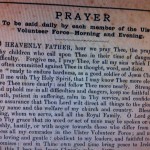DEVELOP PASTORAL LOYALISM – THE REAL WAY FORWARD IN 2013
Former Blanket columnist and Unionist commentator, DR JOHN COULTER, maintains that 2013 should see the Christian Churches set up to the mark and develop Pastoral Loyalism to help the beleaguered Protestant working classes.
The Christian Churches in Northern Ireland have a moral and spiritual duty to develop the concept of Pastoral Loyalism within the Protestant working class.
The flags debate has effectively lifted the lid on the existence of an extensive loyalist underclass which has been festering since 1998 and the signing of the Good Friday Agreement.
On paper, the Unionist Forum suggested by mainstream party leaders Peter Robinson and Mike Nesbitt, looks like a comprehensive way forward. In practice, it could tumble into the pitfall of being nothing more than a 2013 version of the successful Unionist Coalition – or United Ulster Unionist Council (affectionately known as the Treble U-C) – which carved up the Westminster seats for the two 1974 Westminster General Elections.
Cynics could suggest the Unionist Forum represents the opening shots in the 2014 European election campaign in a bid to ensure that increasing Protestant voter apathy does not result in Unionism losing its second seat to nationalism.
For too long, the position of many of the Christian Churches towards loyalism has been either one of condemnation or confrontation – condemning loyalism for its actions during the conflict, or making ‘hell fire’ type sermons and speeches which ‘egged on’ loyalists to take that action.
Is it any wonder that loyalist leaders such as the late Gusty Spence and David Irvine turned towards agnostic, even atheistic socialism as an alternative to the failure of many Christian Church clerics to provide positive and meaningful leadership for the loyalist working class.
For many in the loyalist community, the Christian faith became linked to Protestant fundamentalism and the Free Presbyterian Church – founded by Ian Paisley senior in 1951 – in particular. This perception was also fuelled by the number of members of the ‘Free P Church’ who were active in the early decades of the DUP. Indeed, the Free P’s were often dubbed the DUP at prayer.
If Pastoral Loyalism is to be a concept more than the empty rhetoric of a Sunday evening sermon, the Christian Churches must move beyond the traditional imagery of soup kitchens and evangelical street reaches. The Churches must fill the current political vacuum created by the mainstream Unionist parties’ totally politically suicidal decision to move ‘upmarket’ and ignore the plights of working class Protestants.
The loyalist working class must learn to trust the Churches again. Too often, the perception is that the hell-fire sermons of the past lit the fuses which sent many young Protestants to a jail cell or an early grave. The Churches have an uphill task in 2013 to win the confidence of the Protestant working class.
To achieve this, the Churches will have speak and move as a united movement. Such is the depth of outrage and frustration among the working class Protestant community, that that Churches can no longer leave the re-building of this Loyalism/Christian Church partnership to a few well-meaning congregations, individual clerics, fringe denominations, or pressure groups such as the Evangelical Protestant Society or the Caleb Foundation.
The Unionist Forum looks lovely reading on paper, but is it really another electoral ploy to get working class Protestant voters mobilised for the 2014 European poll when the Unionist family – because of splits and voter apathy – will be hard-pushed to retain its second seat?
Indeed, such is the feeling of abandonment among working class Protestants that they have suggested the formation of a People’s Forum to discuss a way forward for loyalism. At this point, these ordinary loyalists will come to the mainstream Unionist politicians and parties with what they want those politicians to do.
This is very much a question of history repeating itself. A century ago, the network of Unionist Clubs throughout Ireland, and especially in the Province of Ulster when the entire island was part of the British Empire, working class Protestants devised a strategy which they took to the leadership of the Ulster Unionist Council.
The Unionist people devised the policy to defeat Home Rule, and the politicians – aided by the Orange Order and Carson’s Ulster Volunteers – implemented it.
What is now needed is a Churches Forum whereby representatives of all the Protestant denominations can meet with the loyalist working classes and draw up a strategy to move the loyalist community forward. If the Unionist parties cannot provide effective leadership, then the Christian Churches must do it through Pastoral Loyalism.
The Churches Forum can also report to the Unionist Forum so that Unionism’s political leaders are left in no doubt just how deep the crisis is in loyalism. Nor should the Churches Forum limit its influence merely to trying to increase attendance in the pews.
The People’s Forum also looks like a sound idea on paper, provided it is not infiltrated by MI5 or police intelligence for their own agendas. In the campaign against the November 1985 Anglo-Irish Agreement, the loyalist working class mobilised in a network of Ulster Clubs.
Again, that network mirrored the successful Home Rule-era of Unionist Clubs. But loyalists must remember that the Unionists of 1913 did not face the added problem of the British intelligence community.
Westminster and Dublin want the peace process to work. If the cause of the plight of the loyalist working class becomes a constant irritation, that British intelligence community will work to discredit any effort to mobilise loyalism. After all, MI5 is not going to have a £20 million building near Holywood lying empty.
The Christian Churches must act positively on the words of Jesus Christ Himself in the Beatitudes when He talked about ‘Blessed are the peacemakers’. Also, given the growing influence of the cross-border and British-Irish bodies and organisations, loyalists must ‘box clever’ politically and devise a workable campaign in the Republic which will highlight their cause for civil rights.







2 Responses to Developing Pastoral Loyalism.